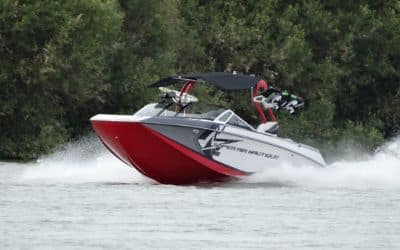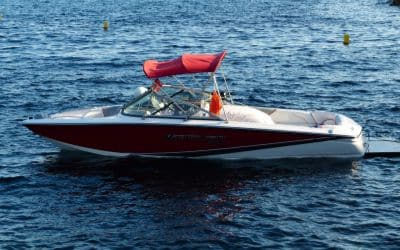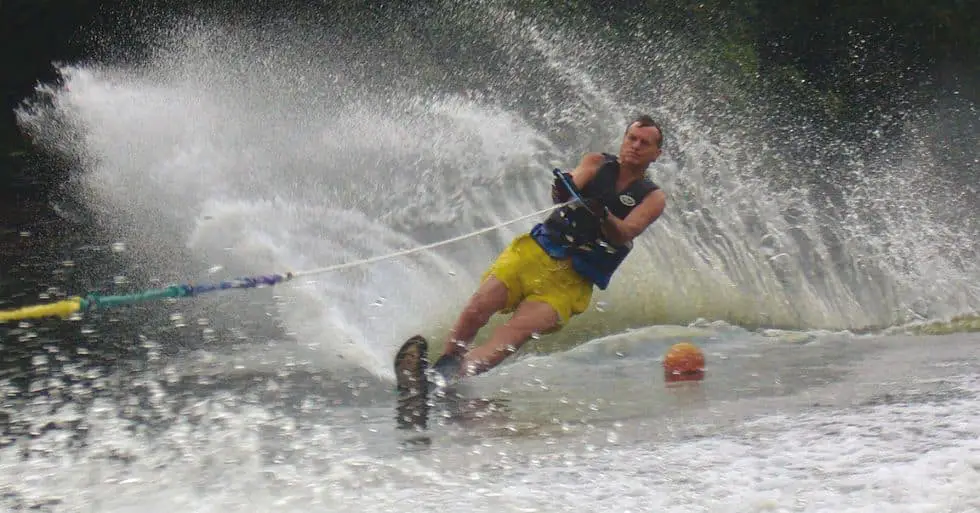Speed for watersports depends on the experience and personal preference of the rider. If you like to do tricks or ride aggressively, a higher speed will suit you best. If not, a lower speed may be better. However, below is a table of around what speed you should be going for each watersport:
| Water Sport | Speed (MPH) | Speed (KPH) |
|---|---|---|
| Water Skiing | 18-37 mph | 29-60 kph |
| Slalom Skiing | 23-37 mph | 37-60 kph |
| Wakeboarding | 17-25 mph | 27-40 kph |
| Wakesurfing | 9-13 mph | 14-21 kph |
| Knee Boarding | 13-20 mph | 21-32 kph |
| Tubing | 10-25 mph | 16-40 kph |
| Barefooting | 30-45 mph | 48-72 kph |
Professional water skiers often push to speeds around 36 mph maximum. This allows them to sharply carve into the water and turn as quickly as possible. However, going that fast introduces you to risks if you fall. One of the leading injuries from water skiing is concussions, so I generally recommend using a helmet such as this one on Amazon.
Beginner water skiers should only stick to around 18 mph for duel skiing and 23-26 mph for slalom. However, If you go too slow, it will make it difficult for the skiers to get up. So it’s generally recommended to take off at or near full speed at the start (especially for slalom skiing) and then slow down after they get up.
How to know exactly what speed is best for you?
All beginners should start out at a slow speed and work their way up to faster speeds. Most of it is personal preference; however, each speed level does have its pros and cons.
Faster speeds allow quicker mobility and the ability to perform tricks better and easier. Although higher speeds also require you to be in shape and able to hold on to the rope at those speeds. You’re also at a higher risk of injury when going faster.
Slower speeds will be safer and generally easier to hang on to the rope.
So my recommendation is to start at the lowest speed and go up 1 mph after every day until you reach a speed that you feel comfortable at. Then as you learn how to carve or do tricks better, slowly raise it until you’ve reached your maximum speed tolerance.
What horsepower is required to tow a skier, wakeboarder, and more?
Although horsepower doesn’t dictate everything when it comes to towing power, you’ll need for your boat to tow a skier, wakeboarder, tuber, etc. it is one of the best indicates. Boat weight and shape also should be noted when determining towing capacity.
However, I wrote a whole article on this topic here and found this:
| Water Sport | Minimum hp | Recommended hp |
|---|---|---|
| Wakeboarding | 70 horsepower | 150 horsepower |
| Water Skiing | 70 horsepower | 150 horsepower |
| Tubing | 70 horsepower | 150 horsepower |
| Knee Boarding | 50 horsepower | 150 horsepower |
| Wake Surfing | 100 horsepower | 200 horsepower |
| Barefooting | 175 horsepower | 250 horsepower |
What boats are best for towing based on each type of watersport?
When it comes to different watersports, there are only really two different kinds of boats, and that is a wake boat and a ski boat. Here is what I recommend for each water sport.
| Water Sport | Best type of boat |
|---|---|
| Wakeboarding | Wake Boat |
| Water Skiing | Ski Boat |
| Tubing | Ski Boat |
| Knee Boarding | Ski Boat |
| Wake Surfing | Wake Boat |
| Barefooting | Ski Boat/Wake Boat |
Wake boats make a larger wake by using technology such as ballasts and wedges. They also have a high rope connection point on their mast that helps wakeboarders get up and jump wakes.

Ski boats generally have their engine in the middle of the boat and strive to make as little of a wake as possible.

Both boats can go up to speeds of around 36-55 mph and can be used for much more than just watersports; however, neither of them perform well in rough water.
Best Brands for wake and ski boats?
Most brands that make these boats make both wake and ski boats as they are very similar. However, below I’ve listed the best brands for each type and what watersports there best for.
| Best ski boat brands | Best wake boat brands |
|---|---|
| MasterCraft | MasterCraft |
| Ski Nautique | Malibu |
How long should the tow rope be for each water sport?
Tow rope length is also something that is subjective, and every skier/wakeboarder prefers different lengths. However, here are the averages for each watersport type:
| Water Sport | Recommended rope length |
|---|---|
| Wakeboarding | 65-85 ft |
| Water Skiing | 50-75 ft |
| Tubing | 50-65 ft |
| Knee Boarding | 60-70 ft |
| Wake Surfing | 7-30 ft |
| Barefooting | 80-85 ft |
When it comes to skiing, wakeboarding, and wake surfing, shorter ropes are meant for beginners. Its generally recommended to use as long a rope as you can manage.
Longer ropes allow for the rider to have a larger and wider wake which generally suits advanced riders better.
Additional water sport safety tips
These include:
- Wear a watersports helmet
- Always wear a lifejacket
- Be cautious when learning new tricks
- Don’t do it drunk or under the influence of any drugs
- Wear a wet suit if the water is below 70 degrees
- Make sure there is always a spotter
- Preferably have someone on board that knows how to do CPR
Tens of thousands of people get injured each year from watersports, and some even die. Taking these safety steps will help make sure that doesn’t happen to you or anyone you’re with.
What sized water skis or board should you get?
Depending on how fast you plan on going, what your skill level is and how much you weigh, the size of skis or board you should get depend. Along with that, some people prefer having smaller or larger skis/boards because they feel it suits them better.
However, below is what size we recommend using:
Water ski size
waterskiworld.com created a perfect chart depending on boat speed and weight that you can use to find your perfect water ski size:
| Skier Weight | Boat Speed 26-30 mph | Boat Speed 30-34 mph | Boat Speed 34-36 mph |
|---|---|---|---|
| 60-100 lbs. | 59″-63″ | 59″-63″ | 59″-63″ |
| 95-125 lbs. | 62″-64″ | 62″-63″ | 62″-63″ |
| 115-140 lbs. | 64″-66″ | 63″-66″ | 63″-65″ |
| 135-160 lbs. | 66″-67″ | 65″-66″ | 64″-66″ |
| 150-180 lbs. | 67″-68″ | 66″-67″ | 65″-67″ |
| 170-200 lbs. | 68″-72″ | 67″-68″ | 66″-68″ |
| 190-215 lbs. | 72″ | 68″-72″ | 67″-68″ |
| 210 lbs & up | 72″ | 68″-72″ | 68″-72″ |
Wakeboard size
Evo.com (a wakeboard manufacturer) recommends these sizes depending on your weight:
| Rider Weight (lbs) | Wakeboard Length (cm) |
|---|---|
| < 100 | < 130 |
| 90-150 | 130-134 |
| 130-180 | 135-139 |
| 170-250 | 140-144 |
| 200-275+ | > 144 |
Wakesurf size
Evo.com also has a wake surf sizing guide based on weight and surfing style:
| Rider Weight | Surf Style | Skim Style | Hybrid Style |
|---|---|---|---|
| Up to 110 lbs | Up to 4′ | Up to 4′ | Up to 4′ |
| 100 – 170 lbs | 4′ – 4’8″ | 4′ – 4’4″ | 3′ 9″ – 4′ 8″ |
| 150 – 200 lbs | 4’8″ – 5′ | 4’4″ – 4’10” | 4′ 8″ – 5′ 3″ |
| 190 – 250+ lbs | 5’+ | 4’10″+ | 5’+ |
FAQ
Beginner water skiers should start at around 18 mph for duel skis and 23 mph for slalom. However, during take-off, you may exceed this speed as you will need to go fast to make it easier for the skier to get up. More on that later.
Beginner wakeboarders should start at around 17 mph. At this speed, tricks and carving may be difficult, so you will want to bump it up as soon as you’re comfortable.
Depending on how wide your skis are and how much you weigh, generally, the lowest speed you can go is 10 mph. Any lower than that, and you will probably just sink. However, it’s recommended not to go any slower than 18 mph for duel skis and 23 mph for slalom skiing.
- What Is The Cheapest Way To Store A Boat? - February 28, 2023
- Do Boats Need Bottom Paint? (Uncovering the Truth) - February 2, 2023
- How Much Is Bass Boat Insurance? (Real Quotes) - January 18, 2023

